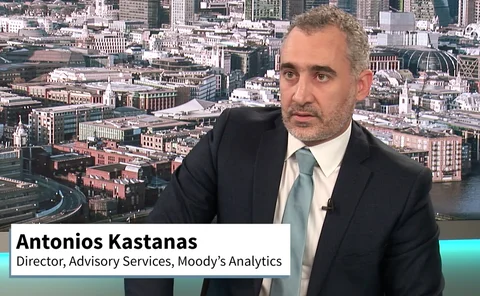API
Why credit risk managers need to see around corners
The Covid‑19 pandemic – and the subsequent extreme volatility – has exposed the fragility of long-established market and supply chain systems, affecting borrowers’ ability to repay debt. David Croen, global head of credit risk products at Bloomberg,…
Switching CCP – How and why?
As uncertainty surrounding Brexit continues and the impacts of Covid-19-driven market volatility are analysed, it is essential for banks and their end-users to understand their clearing options, and how they can achieve greater capital and cross…
Scrutiny and frictions follow EMS vendors into fixed income
Aggregators are facing resistance from venues and attracting the attention of regulators
Extreme volatility – Rising to the fair valuations challenge
Capital markets firms of all sizes continue to grapple with the challenge of developing fair valuations for the illiquid and hard-to-value securities they hold. While this scenario isn’t likely to be resolved anytime soon, there are specialist providers…
Counterparty credit risk – Why data is only valuable in context
Paul Whitmore, global head of counterparty risk solutions at Fitch Solutions, explains how qualitative data can add colour and insight to quantitative metrics for assessing the creditworthiness of counterparty banks
Implementing Basel IV in Asia-Pacific – Mapping out the next steps
This webinar explores the current pain points and provides insights on Basel IV implementation in Apac, addressing the most common challenges and what it takes to transform to a Basel IV-compliant financial institution
Three strategic priorities to meet the new FFIEC regulations
This webinar analyses the key challenges and strategic priorities for firms to meet the evolving requirements for operational resilience
Dealers turn to mid-cap and EM deal-contingent trades
Premiums of more than 25% are attractive to banks battling low vol and increasing competition
ICAAP/ILAAP – Unlocking business value from capital and liquidity assessment
Regulators consider banks’ internal capital adequacy and assessment process (ICAAP) and internal liquidity adequacy assessment process (ILAAP) important tools in managing risk. The European Central Bank’s (ECB’s) updated guidance – which came into effect…
Credit risk – The bank data challenge in frontier markets
As the regulatory net tightens, banks working in and across frontier regions are under pressure to source and maintain more accurate data in the assessment of counterparty credit risk, but some are investing in tools to tackle the problem
ICAAP/ILAAP – How can banks improve the process?
Regulators consider banks’ internal capital and liquidity adequacy assessment processes (ICAAP/ILAAP) – important tools in managing risk
ICAAP/ILAAP – What’s new and what’s next?
The European Central Bank’s ICAAP and ILAAP guidelines aim to harmonise European banks’ approach to capital and liquidity management
Smarter trading in a fragmented world
FX Week recently hosted a webinar in partnership with Refinitiv to ask foreign exchange industry leaders to discuss geopolitical challenges, market changes and developments, and evolving technologies, and how they have shaped forex markets in Asia
Initial margin – A regulatory bottleneck
With the recent announcement of an extended preparation period for those smaller entities needing to post initial margin under the uncleared margin rules, the new timetable could cause a bottleneck for firms busy repapering derivatives contracts linked…
MVA taking the long road to acceptance
Four years on, the adjustment is still not a standard part of non-cleared swap pricing
The problem with GRC
Boards may care more about products and profits than governance, risk and compliance (GRC). But without an effective GRC programme, the fun soon stops when trouble calls, says Michael Gibbs, chief executive of SureStep Risk + Analytics
The Fundamentals of market risk rules
With the 2022 Fundamental Review of the Trading Book (FRTB) deadline looming, banks are fast coming to grips with the amount of work still to be done to achieve a successful implementation
Competitive differentiation – Reaping the benefits of XVA centralisation
A forum of industry leaders discusses the latest developments in XVA and the strategic, operational and technological challenges of derivatives valuation in today’s environment, including the key considerations for banks looking to move to a standardised…
Sandbar's focus on idiosyncratic factors sets it apart from its peers in equity market‑neutral
With investors sometimes struggling to find hedge funds that deliver uncorrelated, consistent returns, Sandbar Asset Management stands out from its peers. Its success in running an equity market-neutral strategy is a reflection of its founder and chief…
The theoretical foundations of XVAs
Bloomberg analyses the theoretical basis of XVAs, focusing on the works and findings of its head of quantitative XVA analytics, Mats Kjaer, who emphasises the role of the capital valuation adjustment as a major driver of derivatives trading profitability…
Prime services – It’s about what you bring
There are many benefits to integration – particularly when it comes to the provision of prime services. Societe Generale has followed this path, which has allowed it to improve cost efficiency and improve the range of products it can offer. The bank has…
Seamless integration – Drivers of and barriers to cloud adoption
Siarhei Niaborski, executive vice-president of risk at CompatibL, discusses the rate of cloud adoption in the capital markets industry and its possible drivers and barriers, how firms can derive maximum value from cloud usage and the criteria on which…
Navigating the impact of climate risk on financial stability
As uncertainty abounds on the impact climate change may have on the industry, financial services firms must best equip themselves for potential regulatory and socioeconomic changes to ensure they maximise the opportunities of embracing new best practices…























